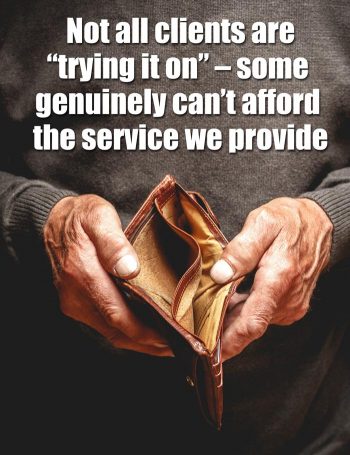Veterinary practices are businesses. Their purpose is to make money for their owners.
I state this clearly, because it’s a truth always felt incongruous.
We all have our own reasons for entering the profession, of course, but mine didn’t include owning a business – that aspect of the veterinary world barely crossed my mind – and perhaps I could be forgiven for letting it pass me by in veterinary school as it was scarcely mentioned.
Don’t mention the war
You don’t need me to tell you things have changed in the profession recently – nowadays, vets are less likely to own, or aspire to owning, the practice they’re working for.
The wheel is still very much in spin is this regard, and whether this is a good thing isn’t the point of this blog – except to say that, like this blog, corporatisation seems to be something we aren’t talking about in the profession. We skirt around the edges, standing by and watching, slightly dizzy at the pace of change, and not having serious discussions about its implications.
Whether a serious discussion would have any effect on the final outcome, whatever that may be, is another question.
Money problems

Regardless of who is earning the profits, vet practices are businesses. There’s no more shame in making money from the veterinary profession than from, say, picture frames, or waste disposal, or making tiny plastic figures for boardgames – at least, so my brain says.
That said, whenever I write anything like this I have a nagging, insistent feeling in my gut that maybe there is some shame – but I try not to think with my gut, as that’s not really what it’s for.
It’s a job, and we put our hearts and souls into it – often to the detriment of our own health – and deserve to get paid. Where else is the money going to come from?
Logically, it makes sense. The temptation to “let people off”, or turn a blind eye to aspects of the bill, is strong in some cases. But if you do, other people must pay more to make up the difference or, ultimately, the practice will go out of business and you will be out of a job. Logic.
The price is (not) right
I remember working several nights in an emergency clinic as a locum; one emergency after another, through the night. I didn’t talk to the clients first – I saw one emergency then picked up the next, one after the other, with no prior knowledge.
It was exciting and dynamic, and to an extent I enjoyed it, but it was also stressful and emotionally draining.
One case involved a small dog that had eaten an entire cake with large amounts of dark chocolate on it. I weighed the dog and we worked out roughly how much theobromine the dog would have ingested. Even a conservative estimate suggested the dog had easily munched its way into a toxic and potentially fatal dose.
I quoted a price for apomorphine and supportive treatment through the night. The price surprised me; it certainly surprised the owner, who couldn’t afford it. They couldn’t afford the consultation and the apomorphine without the supportive treatment – they had barely managed to pay for the cake.
Blame game
None of this was my fault. I hadn’t given them the cake, or forced them to have a dog, or left the cake in a place where the dog could eat it. I didn’t know the fine details of their finances, or the circumstances that had led these people into poverty.
For the record, I don’t think poverty is something people deserve because they’re lazy or workshy; I think it’s something that happens to people because of circumstance. It’s not a sin nor a sign of their character (that said, even if I’m completely wrong and it is a condition exclusively of the lazy, then so what? There are worse sins than laziness, many of which are richly rewarded).
Whatever the reasons, I was faced with a patient that potentially faced a future of seizures and death, entirely preventable with materials I had within several metres of me.
Helpless

The owners, worried for their pet, had been told to come in, and were told their worries were indeed justified and their pet might die. I told them other ways to make their pet vomit, none of which had ever worked for me in practice and some of which were potentially dangerous, and they left.
I was a locum and had no scope for leeway in their bill, and the owners simply couldn’t afford the prices, which seemed pretty high even to me, someone quite used to feeling uncomfortable about charging for illness.
I’m not sure I have ever felt so powerless or so depressed after a consultation. I never learned what became of the dog. Hopefully I got the dose estimate wrong.
A bigger problem
I’m not completely naive. I know clients are ready to use emotional blackmail against us, probably because they understand – at least on a subconscious level – that we’re uncomfortable about charging sometimes. But I hope you’re with me enough to accept not all clients are “trying it on” – some genuinely can’t afford the service we provide, to the detriment of their pets and to their own sorrow.
I’m honestly not sure what the fundamental point of this blog is. I’m trying to dissect and examine that feeling in my gut that nags and bothers me whenever I say I logically understand we have to charge well for our services. Vets aren’t well paid, whatever the public myth, and you don’t need me to tell you that.
When I have tried to express these half-formed feelings before, a wise person once said to me: “The problem you’re trying to solve there, Nick, is poverty – and that is a problem bigger than the veterinary profession.”
That’s true, but it doesn’t banish the thoughts of that little dog from my mind. I’d be surprised if most of you haven’t had consultations that felt similar.
A good thing?
Maybe it’s good that most of us won’t be owning the business any more. Maybe, shielded by the fact we genuinely have no scope to change what we charge or any leeway to offer, we won’t be haunted by cases like this any more… or maybe I dwell on these things more than I should.
Better people than me are actually making a difference, instead of navel-gazing. Charities exist to work for, with wonderful people doing wonderful things – such as PDSA, Mission Rabies in India or the amazing work of the Street Vet team. Although they can’t change poverty, they counter the effects of it however they can.
As this whole blog makes clear, I never settled that internal dichotomy of wanting to help animals and needing to make money for the business. The two don’t need to be mutually exclusive. Often they’re aligned, but sometimes they aren’t – and sometimes that hurts.
Maybe it’s time for me to start up that company making small plastic figures?

Leave a Reply